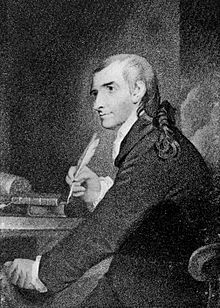Francis Hopkinson
| Francis Hopkinson | |
|---|---|

From The literary history of Philadelphia (1906).
|
|
| Judge of the United States District Court for the District of Pennsylvania | |
|
In office September 26, 1789 – May 9, 1791 |
|
| Nominated by | George Washington |
| Succeeded by | William Lewis |
| Delegate from New Jersey to the Second Continental Congress | |
|
In office June 22, 1776 – November 30, 1776 |
|
| Personal details | |
| Born | September 21, 1737 Philadelphia, Province of Pennsylvania, British America |
| Died | May 9, 1791 (aged 53) Philadelphia, Pennsylvania, U.S. |
| Resting place | Christ Church Burial Ground, Philadelphia |
| Nationality | American |
| Spouse(s) | Ann Borden |
| Alma mater | The Academy and College of Philadelphia |
| Religion | Protestantism |
| Awards | Magellanic Premium (1790) |
| Signature | |
Francis Hopkinson (September 21, 1737 – May 9, 1791) designed the first official American flag. He was an author, a composer, and one of the signers of the Declaration of Independence as a delegate from New Jersey. He served in various roles in the early United States government including as a member of the Continental Congress and chair of the Navy Board. He also served as a federal judge in Pennsylvania.
Francis Hopkinson was born at Philadelphia in 1737, the son of Thomas Hopkinson and Mary Johnson. He became a member of the first class at the College of Philadelphia (now the University of Pennsylvania) in 1751 and graduated in 1757, receiving his master's degree in 1760, and a doctor in law (honorary) in 1790. He was secretary to a Provincial Council of Pennsylvania Indian commission in 1761 that made a treaty with the Delaware and several Iroquois tribes. In 1763, he was appointed customs collector for Salem, New Jersey. Hopkinson spent from May 1766 to August 1767 in England in hopes of becoming commissioner of customs for North America. Although unsuccessful, he spent time with the future Prime Minister Lord North, Hopkinson's cousin James Johnson (Bishop of Worcester), and the painter Benjamin West.
After his return, Hopkinson operated a dry goods business in Philadelphia and married Ann Borden on September 1, 1768. They would have five children.
Hopkinson obtained a public appointment as a customs collector for New Castle, Delaware on May 1, 1772. He moved to Bordentown, New Jersey in 1774, became a member of the New Jersey Provincial Council, and was admitted to the New Jersey bar on May 8, 1775. He resigned his crown-appointed positions in 1776 and, on June 22, went on to represent New Jersey in the Second Continental Congress where he signed the Declaration of Independence. He was appointed to Congress’ Marine Committee in that year. He departed the Congress on November 30, 1776 to serve on the Navy Board at Philadelphia. The Board reported to the Marine Committee. Hopkinson later became the Navy Board’s chairman. As part of the nation's government, he was treasurer of the Continental Loan Office in 1778; appointed judge of the Admiralty Court of Pennsylvania in 1779 and reappointed in 1780 and 1787; and helped ratify the Constitution during the constitutional convention in 1787.
...
Wikipedia
